
Apollo 11 was a spaceflight conducted by the United States and launched by NASA from July 16 to July 24, 1969. It marked the first time that humans landed on the Moon. Commander Neil Armstrong and Lunar Module Pilot Buzz Aldrin landed the Apollo Lunar Module Eagle on July 20, 1969, at 20:17 UTC, and Armstrong became the first person to step onto the Moon's surface six hours and 39 minutes later, on July 21 at 02:56 UTC. Aldrin joined him 19 minutes later, and they spent about two and a quarter hours together exploring the site they had named Tranquility Base upon landing. Armstrong and Aldrin collected 47.5 pounds (21.5 kg) of lunar material to bring back to Earth as pilot Michael Collins flew the Command Module Columbia in lunar orbit, and were on the Moon's surface for 21 hours, 36 minutes, before lifting off to rejoin Columbia.

Neil Alden Armstrong was an American astronaut and aeronautical engineer who, in 1969, became the first person to walk on the Moon. He was also a naval aviator, test pilot, and university professor.
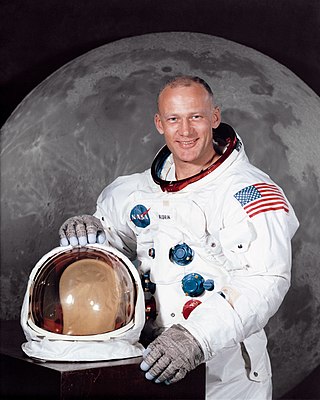
Buzz Aldrin is an American former astronaut, engineer and fighter pilot. He made three spacewalks as pilot of the 1966 Gemini 12 mission, and was the Lunar Module Eagle pilot on the 1969 Apollo 11 mission. He was the second person to walk on the Moon after mission commander Neil Armstrong. Following the death of Michael Collins in 2021, he is the last surviving Apollo 11 crew member.
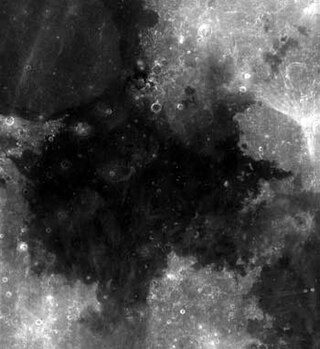
Mare Tranquillitatis is a lunar mare that sits within the Tranquillitatis basin on the Moon. It contains Tranquility Base, the first location on another celestial body to be visited by humans.

Eugene Andrew Cernan was an American astronaut, naval aviator, electrical engineer, aeronautical engineer, and fighter pilot. During the Apollo 17 mission, Cernan became the 11th human being to walk on the Moon. As he re-entered the Apollo Lunar Module after Harrison Schmitt on their third and final lunar excursion, he remains the most recent person to walk on the Moon.
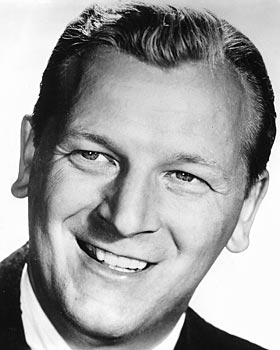
Leslie Thompson Baxter was an American musician, composer and conductor. After working as an arranger and composer for swing bands, he developed his own style of easy listening music, known as exotica and scored over 250 radio, television and motion pictures numbers.

Destination Moon is a 1950 American Technicolor science fiction film, independently produced by George Pal and directed by Irving Pichel, that stars John Archer, Warner Anderson, Tom Powers, and Dick Wesson. The film was distributed in the United States and the United Kingdom by Eagle-Lion Classics.
Harry Revel was a British-born American composer, mostly of musical theatre, working with various lyricists, notably Mack Gordon. He is also seen as a pioneer of "space age pop".

Lunar plaques are stainless steel commemorative plaques measuring 9 by 7+5⁄8 inches attached to the ladders on the descent stages of the United States Apollo Lunar Modules flown on lunar landing missions Apollo 11 through Apollo 17, to be left permanently on the lunar surface. The plaques were originally suggested and designed by NASA's head of technical services Jack Kinzler, who oversaw their production.

For All Mankind is a 1989 documentary film made of original footage from NASA's Apollo program, which successfully prepared and landed the first humans on the Moon from 1968 to 1972. It was directed by Al Reinert, with music by Brian Eno. The film, consisting of footage from Apollo 7 through Apollo 17, was assembled to depict what seems like a single trip to the Moon, highlighting the beauty and otherworldliness of the images by only using audio from the interviews Reinert conducted with Apollo crew members.

Magnificent Desolation: Walking on the Moon 3D is a 2005 IMAX 3D documentary film about the first humans on the Moon, the twelve astronauts in the Apollo program.

Apollo 11 was the first human spaceflight to land on the Moon. The 1969 mission's wide effect on popular culture has resulted in numerous portrayals of Apollo 11 and its crew, Neil Armstrong, Buzz Aldrin, and Michael Collins.

Bruce Martin Woolley is an English musician, singer, songwriter, and record producer. He wrote songs with artists such as the Buggles and Grace Jones, including "Video Killed the Radio Star" and "Slave to the Rhythm", and co-founded the Radio Science Orchestra.

First Man: The Life of Neil A. Armstrong is the authorised biography of Neil Armstrong, the astronaut who became the first human to walk on the Moon, on July 20, 1969. The book was written by James R. Hansen and was first published in 2005 by Simon & Schuster. The book describes Armstrong's involvement in the United States space program, and details his personal life and upbringing.
Samuel J. Hoffman was a notable thereminist.
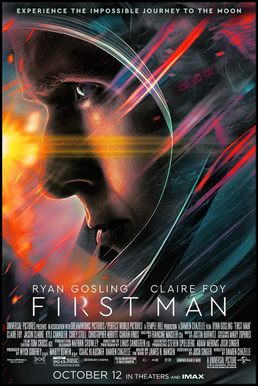
First Man is a 2018 American biographical drama film directed by Damien Chazelle from a screenplay by Josh Singer, based on the 2005 book by James R. Hansen. The film stars Ryan Gosling as Neil Armstrong, alongside Claire Foy, Jason Clarke, Kyle Chandler, Corey Stoll, Christopher Abbott, and Ciarán Hinds, and follows the years leading up to the Apollo 11 mission to the Moon in 1969.
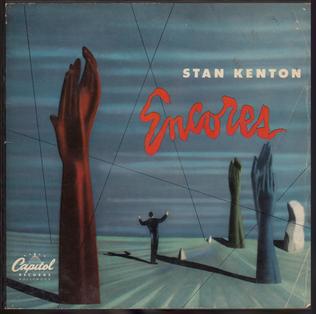
Encores is an album by pianist and bandleader Stan Kenton featuring performances recorded in 1945–47 and originally released on the Capitol label as three 78rpm discs in 1949, reissued as a 10-inch LP in 1950, and then as a 12-inch LP in 1955 with additional tracks.
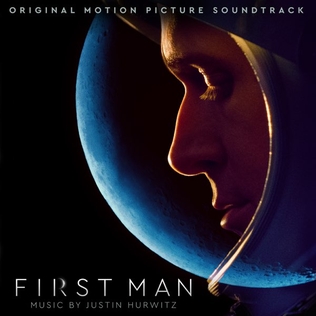
First Man (Original Motion Picture Soundtrack) is the soundtrack album to the 2018 film First Man, directed by Damien Chazelle. The musical score was composed by Chazelle's usual collaborator and Harvard University classmate, Justin Hurwitz. The score uses electronic, orchestral and vintage sounds. In addition to a 94-piece orchestra, an electronic theremin, a moog synthesiser and several other instruments were used, fused with vintage sound-altering machines during the audio mix. The soundtrack released by Back Lot Music on October 12, 2018, received positive reviews from critics, who praised it for its balance of softer melodic passages and powerful themes. Hurwitz's score received several awards and nominations, including the Golden Globe Award for Best Original Score.
















